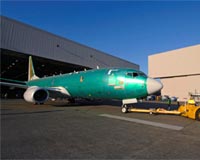| . |  |
. |
Belfast, UK (SPX) Aug 03, 2009 A Queen's University Belfast academic is working on research that could help protect the lives of military based in Afghanistan. Professor Wei Sha from Queen's School of Planning, Architecture and Civil Engineering has been testing how safe vehicles with titanium alloys are when attacked by bullets or explosions. Professor Sha's research examines the damage tolerance of the popular material titanium. It is the first research of its kind to reveal the reasons behind the deformation and damage of titanium alloys under strong impact or fast applied force. Military based in Afghanistan currently use land rovers which have titanium alloys. Professor Sha has already discovered that like virtually all metals, titanium is weakened under force and at an elevated temperature. He said: "This research started with a study visit by Professor Guoqing Wu, from Beijing University of Aeronautics and Astronautics, a university specialised in aerospace education and research. The success of the research shows the importance of developing international collaboration." Professor Sha is aiming to go a step further with the research and predict what will happen if the alloys are compressed. This compression process normally happens when manufacturers want to transform the material into a plate or short drum shape by using a compression machine. This form of titanium is often used in the aeronautic and astronautic industry. But compression can also happen when faced with an unexpected situation such as when the military are being attacked by bullets or explosives. Although the process usually happens at room temperature, the temperature inside the alloy could heat up to several hundred degrees as heat is generated through deformation. Professor Sha predicts this could weaken the alloys and endanger the lives of those travelling in the vehicle. He said: "Sometimes, deformation of a metal is a desirable property. It is essential for completing its forming and shaping process. In other occasions, deformation is unwanted, especially in a finished product, which people want to maintain its shape during service. Either way, it is important to understand the deformation behaviour, so as to be able to devise methods to control the deformation." He set out to make sense of the complicated phenomenon so that if an explosion or military attack occurs those involved will know what to expect. The end research could be used by manufacturers for advice on safety, material selection, optimisation and component design. Professor Sha hopes that this new model will cut back on the number of costly experiments which are needed to test the safety of titanium. Share This Article With Planet Earth
Related Links Queen's University Belfast The latest in Military Technology for the 21st century at SpaceWar.com
 Boeing Rolls Out US Navy's P-8A Poseidon
Boeing Rolls Out US Navy's P-8A PoseidonSeattle WA (SPX) Aug 03, 2009 Boeing and the U.S. Navy have formally unveiled the service's newest maritime patrol and reconnaissance aircraft, the P-8A Poseidon, during a ceremony at the Boeing facility in Renton, Wash. A derivative of the Next-Generation 737-800, the P-8A is a long-range anti-submarine warfare, anti-surface warfare, intelligence, surveillance and reconnaissance aircraft capable of broad-area ... read more |
|
| The content herein, unless otherwise known to be public domain, are Copyright 1995-2009 - SpaceDaily. AFP and UPI Wire Stories are copyright Agence France-Presse and United Press International. ESA Portal Reports are copyright European Space Agency. All NASA sourced material is public domain. Additional copyrights may apply in whole or part to other bona fide parties. Advertising does not imply endorsement,agreement or approval of any opinions, statements or information provided by SpaceDaily on any Web page published or hosted by SpaceDaily. Privacy Statement |